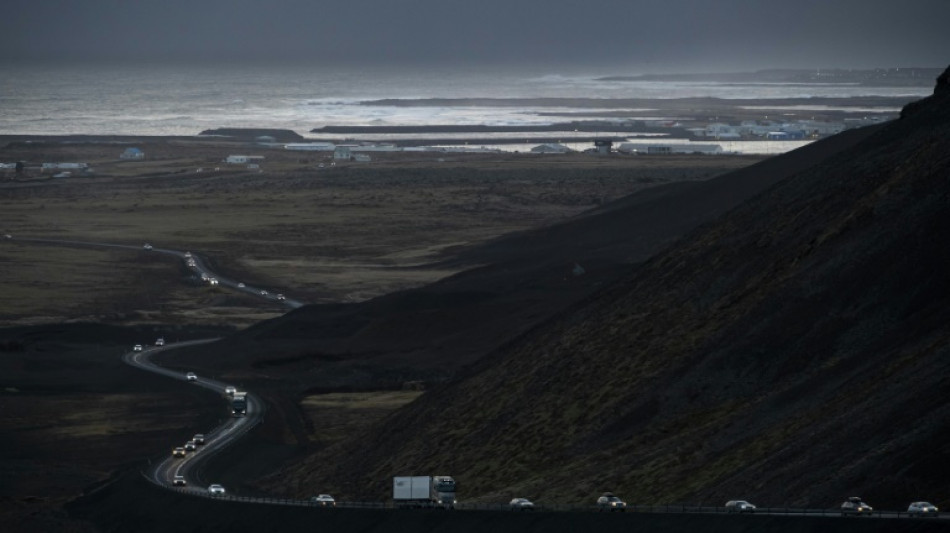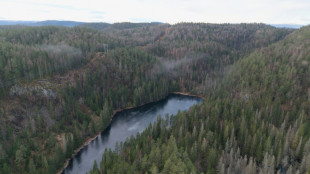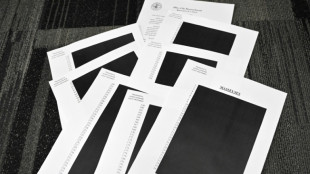
-
 India drops Shubman Gill from T20 World Cup squad
India drops Shubman Gill from T20 World Cup squad
-
Tens of thousands attend funeral of killed Bangladesh student leader

-
 England 'flat' as Crawley admits Australia a better side
England 'flat' as Crawley admits Australia a better side
-
Australia four wickets from Ashes glory as England cling on

-
 Beetles block mining of Europe's biggest rare earths deposit
Beetles block mining of Europe's biggest rare earths deposit
-
French culture boss accused of mass drinks spiking to humiliate women

-
 Burning effigy, bamboo crafts at once-a-decade Hong Kong festival
Burning effigy, bamboo crafts at once-a-decade Hong Kong festival
-
Joshua knocks out Paul to win Netflix boxing bout

-
 Dogged Hodge ton sees West Indies save follow-on against New Zealand
Dogged Hodge ton sees West Indies save follow-on against New Zealand
-
England dig in as they chase a record 435 to keep Ashes alive

-
 Wembanyama 26-point bench cameo takes Spurs to Hawks win
Wembanyama 26-point bench cameo takes Spurs to Hawks win
-
Hodge edges towards century as West Indies 310-4, trail by 265

-
 US Afghans in limbo after Washington soldier attack
US Afghans in limbo after Washington soldier attack
-
England lose Duckett in chase of record 435 to keep Ashes alive

-
 Australia all out for 349, set England 435 to win 3rd Ashes Test
Australia all out for 349, set England 435 to win 3rd Ashes Test
-
US strikes over 70 IS targets in Syria after attack on troops

-
 Australian lifeguards fall silent for Bondi Beach victims
Australian lifeguards fall silent for Bondi Beach victims
-
Trump's name added to Kennedy Center facade, a day after change

-
 West Indies 206-2, trail by 369, after Duffy's double strike
West Indies 206-2, trail by 369, after Duffy's double strike
-
US strikes Islamic State group in Syria after deadly attack on troops

-
 Epstein files opened: famous faces, many blacked-out pages
Epstein files opened: famous faces, many blacked-out pages
-
Ravens face 'special' Patriots clash as playoffs come into focus

-
 Newly released Epstein files: what we know
Newly released Epstein files: what we know
-
Musk wins US court appeal of $56 bn Tesla pay package

-
 US judge voids murder conviction in Jam Master Jay killing
US judge voids murder conviction in Jam Master Jay killing
-
Trump doesn't rule out war with Venezuela

-
 Haller, Aouar out of AFCON, Zambia coach drama
Haller, Aouar out of AFCON, Zambia coach drama
-
Nasdaq rallies again while yen falls despite BOJ rate hike

-
 Bologna win shoot-out with Inter to reach Italian Super Cup final
Bologna win shoot-out with Inter to reach Italian Super Cup final
-
Brandt and Beier send Dortmund second in Bundesliga

-
 Trump administration begins release of Epstein files
Trump administration begins release of Epstein files
-
UN Security Council votes to extend DR Congo mission by one year

-
 Family of Angels pitcher, club settle case over 2019 death
Family of Angels pitcher, club settle case over 2019 death
-
US university killer's mystery motive sought after suicide

-
 Rubio says won't force deal on Ukraine as Europeans join Miami talks
Rubio says won't force deal on Ukraine as Europeans join Miami talks
-
Burkinabe teen behind viral French 'coup' video has no regrets

-
 Brazil court rejects new Bolsonaro appeal against coup conviction
Brazil court rejects new Bolsonaro appeal against coup conviction
-
Three-time Grand Slam winner Wawrinka to retire in 2026

-
 Man Utd can fight for Premier League title in next few years: Amorim
Man Utd can fight for Premier League title in next few years: Amorim
-
Pandya blitz powers India to T20 series win over South Africa

-
 Misinformation complicated Brown University shooting probe: police
Misinformation complicated Brown University shooting probe: police
-
IMF approves $206 mn aid to Sri Lanka after Cyclone Ditwah

-
 Stocks advance as markets cheer weak inflation
Stocks advance as markets cheer weak inflation
-
Emery says rising expectations driving red-hot Villa

-
 Three killed in Taipei metro attacks, suspect dead
Three killed in Taipei metro attacks, suspect dead
-
Seven Colombian soldiers killed in guerrilla attack: army

-
 Amorim takes aim at Man Utd youth stars over 'entitlement'
Amorim takes aim at Man Utd youth stars over 'entitlement'
-
Mercosur meets in Brazil, EU eyes January 12 trade deal

-
 US Fed official says no urgency to cut rates, flags distorted data
US Fed official says no urgency to cut rates, flags distorted data
-
Rome to charge visitors for access to Trevi Fountain


How much damage could possible Iceland volcano eruption cause?
A town has been evacuated in southwestern Iceland after hundreds of earthquakes caused by shifting underground magma sparked fears of a full-blown volcanic eruption.
While experts fear the town could be badly damaged by a potential eruption, they do not expect a repeat of the global travel chaos caused by ash from the Eyjafjallajokull volcano in 2010.
Here are a few key questions answered:
- What and where? -
The hundreds of earthquakes have been caused by a massive build-up of magma in a 15-kilometre (nine-mile) fissure between two to five kilometres underground.
The fissure is around 3.5 kilometres northwest of Grindavik, a town of 4,000 people on the Reykjanes peninsula. The town has been evacuated as a precaution.
On Wednesday, residents told AFP the seismic activity had damaged roads and buildings.
Previous eruptions near the Fagradalsfjall volcano on Reykjanes peninsula took place in 2021, 2022 and earlier this year, though in less populated areas.
Situated in the North Atlantic, Iceland straddles the Mid-Atlantic Ridge, a crack in the ocean floor separating the Eurasian and North American tectonic plates.
- How likely is an eruption? -
The Icelandic Met Office said on Wednesday that the "probability of an eruption is still considered high".
Vidir Reynisson, head of Iceland's Civil Protection and Emergency Management agency, told AFP on the weekend that "anywhere on that fissure we can see that an eruption could happen".
John Smellie, a volcanologist at the UK's Leicester University, said guessing when the eruption might take place was like guessing "how long is a piece of string".
Smellie told AFP it could be days or weeks -- or "despite all evidence, it might just subside and go away".
- How bad could it be? -
Reynisson said Icelandic experts were "really concerned about all the houses and the infrastructure in the area".
Smellie said any eruption would most likely be similar to the one on the peninsula earlier this year, which created lava fountains and flows that mostly just attracted tourists.
If a new eruption occurs near Grindavik, it could cause significant damage to homes and infrastructure, he added.
However lava flows "relatively slowly, and people can generally at least drive away or run away from it," he said, meaning that deaths were unlikely.
Another possible threat is toxic gas released during an eruption. A 1783 eruption at Iceland's Laki volcanic fissure killed enough livestock to cause widespread famine.
However Phil Collins, a geologist at Brunel University London, said that "it doesn't look like a Laki-scale disaster is likely".
One way the eruption could be more violent is if it blows through ice or water.
If the eruption occurs in the southern tip of the fissure, which is underwater, it could cause ash clouds that would affect flights at Iceland's international airport.
- Different to Eyjafjallajokull?
But any eruption is not expected to have anywhere near as much impact as the one from the Eyjafjallajokull volcano in 2010.
That eruption shot huge amounts of ash into the atmosphere, forcing the cancellation of some 100,000 flights and leaving more than 10 million travellers stranded.
It exploded through 200 metres of ice, making it "highly violent", Smellie said. The interaction with the water created more fine ash particles that would then drift across Europe.
The latest eruption threat is "completely different situation" Smellie said.
D.Moore--AMWN


